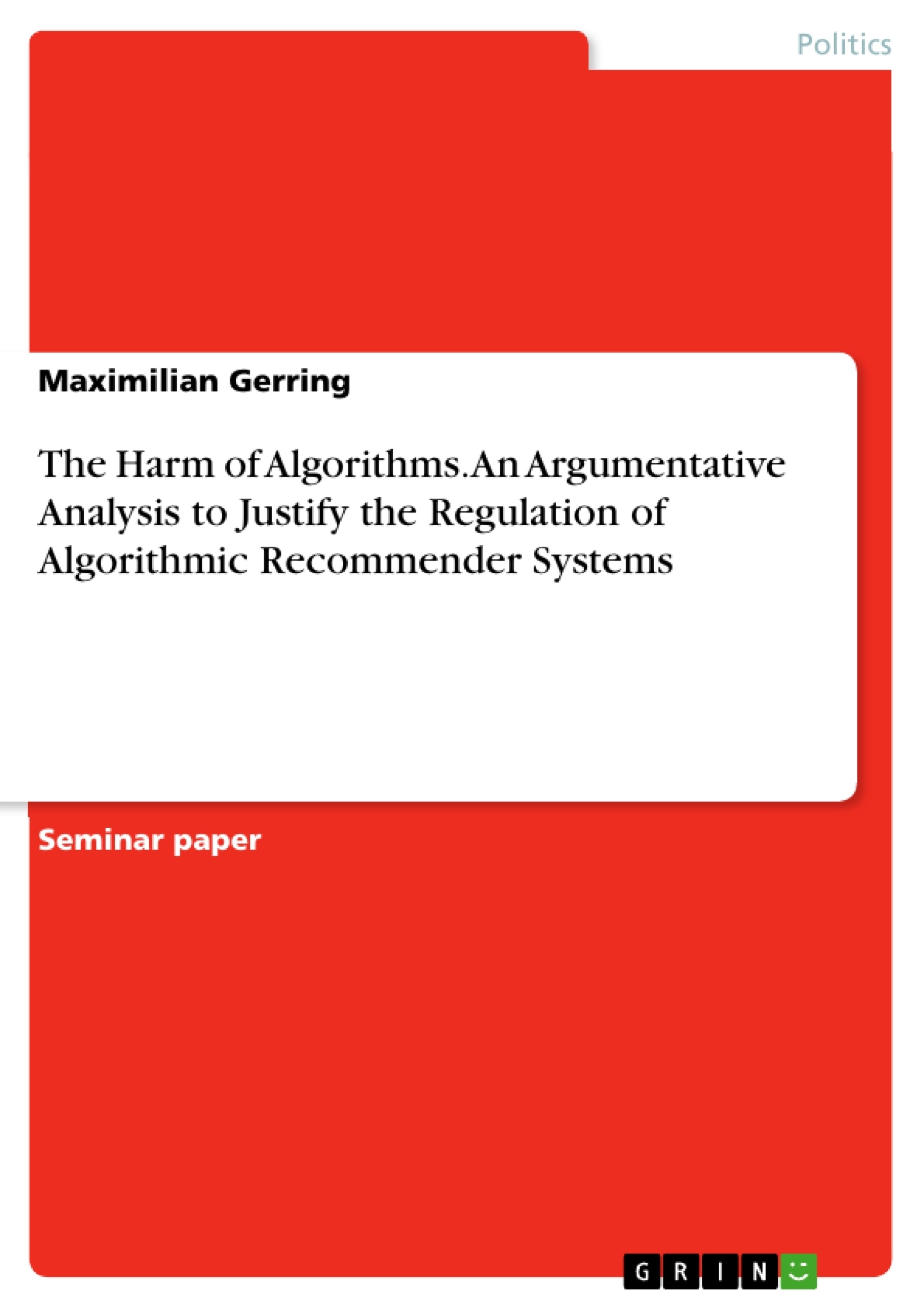The goal of the following paper is to develop a defence for the regulation of algorithmic recommender systems. After demonstrating the harmful effects that algorithmic recommender systems can have, I will build an argument for regulating these systems in order to protect individuals and minority groups from discrimination in social media. In chapter 4, I will address two arguments that act as a foundation against regulating such systems and show that these arguments are not able to present convincing points. In chapter 5, I will bring my argumentation with another pro- regulation argument to an end and finish my paper with a conclusive summary.
Hate, misinformation and political manipulation have grown to become a problem of social scale in the online media of our time. This can have a negative impact outside the digital world. Despite the fact that it can only be the user himself who initially introduces hate and agitation into a discussion, the large operators of social media platforms, namely Facebook, Twitter or Google, are also to be held responsible for the fact that hate can spread on their platforms as quickly as it was not possible in classic media before. Their business model aims to keep users on the platform for a long period of time in order to sell their advertising space as profitably as possible. For this purpose, most of these platform companies use algorithmic recommender systems to push content or products (like YouTube's "Next Videos" or Facebook's "Recommended Groups") which are considered relevant for the user.
Although the platforms, if we follow their argumentation, want to make the user experience with these systems as positive as possible, the practice of providing the user with information that reflects his or her interests leads to the fact that if the user deals with already critical topics these also appear repeatedly in their timeline. This sometimes leads to users being encouraged in their opinion and creates network effects through which users encounter other users with the same opinion or inform themselves about similar topics. In addition to that, personalised advertising whose business model is also based on the same critical algorithmic recommender systems, can cause particular harm in a political context.
Inhaltsverzeichnis (Table of Contents)
- Introduction
- The Harm of Algorithms
- The Problem of Filter Bubbles and Echo Chambers
- Negative Impacts of Algorithmic Suggestions
- The Harm Argument
- Arguments Against Regulation
- The Sphere of Economic Freedom
- The Argument of Intellectual Property
- State Risks – Further Arguments for Restrictions
- Conclusions
Zielsetzung und Themenschwerpunkte (Objectives and Key Themes)
The purpose of this paper is to argue for the regulation of algorithmic recommender systems. It examines the harmful effects these systems can have on individuals and minority groups, particularly in the context of online hate and misinformation.
- The impact of filter bubbles and echo chambers on the formation of opinions
- The role of algorithms in promoting hate speech and extremist content
- The potential for algorithmic discrimination against minority groups
- Arguments against regulation of algorithmic recommender systems
- The need for state intervention to mitigate the harms of algorithmic systems
Zusammenfassung der Kapitel (Chapter Summaries)
The paper begins by outlining the problem of hate, misinformation, and political manipulation in online media. It highlights how social media platforms utilize algorithmic recommender systems to keep users engaged and generate revenue, potentially contributing to the spread of harmful content.
The chapter then explores the specific harm caused by filter bubbles and echo chambers, which can reinforce pre-existing biases and prevent users from accessing diverse perspectives. It examines the negative impacts of algorithmic suggestions, including the potential for promoting extremist content and fostering discrimination against minority groups.
Chapter 3 presents the argument for regulating algorithmic recommender systems, emphasizing the need to protect individuals and minority groups from the harmful effects of these systems. The following chapters address arguments against regulation, exploring the potential for economic and intellectual property restrictions.
Schlüsselwörter (Keywords)
This paper focuses on the impact of algorithmic recommender systems in social media, examining the potential for harm through the creation of filter bubbles, the spread of hate speech, and the promotion of extremist content. Key themes include the regulation of algorithms, state intervention, discrimination against minority groups, and the balance between freedom and responsibility in the online sphere.
Frequently Asked Questions
Why should algorithmic recommender systems be regulated?
Regulation is argued for to protect individuals and minority groups from discrimination, hate speech, and political manipulation facilitated by these systems.
What are "Filter Bubbles" and "Echo Chambers"?
These are digital environments where users are only exposed to information that reinforces their existing beliefs, leading to polarization and a lack of diverse perspectives.
How do social media business models contribute to the problem?
Platforms aim to keep users engaged for as long as possible to sell advertising; algorithms often push sensationalist or extreme content to achieve this.
What are the arguments against regulating algorithms?
Common arguments include the protection of economic freedom and intellectual property rights (algorithms as trade secrets).
Can algorithms discriminate against minority groups?
Yes, by reflecting societal biases or through specific targeting, algorithms can lead to the exclusion or unfair treatment of certain demographic groups.
- Quote paper
- Maximilian Gerring (Author), 2022, The Harm of Algorithms. An Argumentative Analysis to Justify the Regulation of Algorithmic Recommender Systems, Munich, GRIN Verlag, https://www.grin.com/document/1214950



